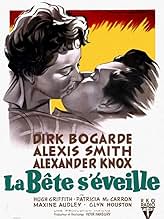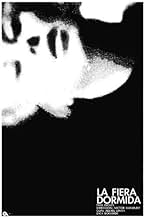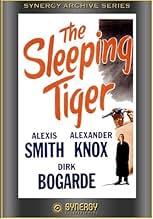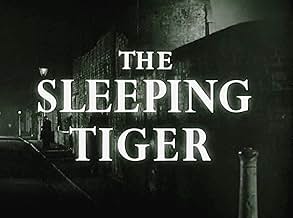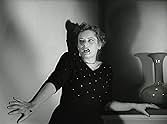CALIFICACIÓN DE IMDb
6.5/10
1.4 k
TU CALIFICACIÓN
Un convicto irrumpe en la casa de un psicoterapeuta. En lugar de ser arrestado, acepta someterse a una rehabilitación, pero la esposa del terapeuta se enamora de él.Un convicto irrumpe en la casa de un psicoterapeuta. En lugar de ser arrestado, acepta someterse a una rehabilitación, pero la esposa del terapeuta se enamora de él.Un convicto irrumpe en la casa de un psicoterapeuta. En lugar de ser arrestado, acepta someterse a una rehabilitación, pero la esposa del terapeuta se enamora de él.
- Dirección
- Guionistas
- Elenco
- Premios
- 1 nominación en total
Jimmy Charters
- Jazz Club Patron
- (sin créditos)
Martin Lyder
- Jazz Club Patron
- (sin créditos)
John Lynn
- Jazz Club Patron
- (sin créditos)
Ross Parker
- Barman
- (sin créditos)
Jim Tyson
- Jazz Club Patron
- (sin créditos)
Harry Van Engel
- Spectator at crash
- (sin créditos)
- Dirección
- Guionistas
- Todo el elenco y el equipo
- Producción, taquilla y más en IMDbPro
Opiniones destacadas
A more apt title would have been The Sleeping Tigress, for it's Alexis Smith's performance that holds this movie together and lends it erotic friction. Despite her old-money looks and regal carriage, Smith numbered among the many talents which Hollywood mis- and under- used. She claimed attention in two late-forties Bogart vehicles, Conflict (where she was good) and The Two Mrs. Carrolls (in which she was even better, and held her own against Barbara Stanwyck). But most of her movie career consisted of mediocre roles the ones the star actresses turned down or had to refuse owing to other commitments. (It wasn't until Stephen Sondheim's Follies on Broadway in the 70s that her own star shone).
In this film from Joseph Losey's English exile following the Hollywood witch hunt, she plays the bored wife of psychotherapist Alexander Knox (and with him pottering around the house, who wouldn't be bored?). Bleeding-heart Knox takes a troubled young man with a prison record (Dirk Bogarde) under his roof in hopes of performing a therapeutic Pygmalion job on him. At first Smith acts snooty, then grows intrigued, and finally throws herself at Bogarde with pent-up abandon.
Comes the crunch as Knox, in a three-minute Freudian breakthrough reminiscent of Lee J. Cobb's instant rehabilitation of William Holden in The Dark Past, turns the lying, thieving, abusive Bogarde into a contrite milquetoast. When Bogarde then bids her farewell, Smith careens into dementia every bit as swiftly as Bogarde was healed and feigns an assault in hopes that Knox will defend her `honor' with that gun every therapist keeps in his desk drawer....
It's a lame story that might have been more convincing in an American context; the London setting and British conventions (in particular Knox's) stifle it. Bogarde started out playing this sort of charming wrong'un but isn't especially memorable here (except for his towering pompadour that must have been borrowed from Mario Lanza). But Smith's feral feline makes The Sleeping Tiger worth the ticket price.
In this film from Joseph Losey's English exile following the Hollywood witch hunt, she plays the bored wife of psychotherapist Alexander Knox (and with him pottering around the house, who wouldn't be bored?). Bleeding-heart Knox takes a troubled young man with a prison record (Dirk Bogarde) under his roof in hopes of performing a therapeutic Pygmalion job on him. At first Smith acts snooty, then grows intrigued, and finally throws herself at Bogarde with pent-up abandon.
Comes the crunch as Knox, in a three-minute Freudian breakthrough reminiscent of Lee J. Cobb's instant rehabilitation of William Holden in The Dark Past, turns the lying, thieving, abusive Bogarde into a contrite milquetoast. When Bogarde then bids her farewell, Smith careens into dementia every bit as swiftly as Bogarde was healed and feigns an assault in hopes that Knox will defend her `honor' with that gun every therapist keeps in his desk drawer....
It's a lame story that might have been more convincing in an American context; the London setting and British conventions (in particular Knox's) stifle it. Bogarde started out playing this sort of charming wrong'un but isn't especially memorable here (except for his towering pompadour that must have been borrowed from Mario Lanza). But Smith's feral feline makes The Sleeping Tiger worth the ticket price.
Even his staunchest devotees would have to acknowledge that the films of Joseph Losey are notoriously uneven. This one is of interest to Losey completists as it marks his first film in England although sadly, for reasons which have been well documented, both he and adaptors Foreman and Buchman were 'fronted' in the credits.
Losey has done his very best with the melodramatic material at his disposal and has given the film an edginess unusual for the time. There is a palpable sexual tension(surprisingly enough) between the psychotherapist's wife of Alexis Smith and the case for treatment of Dirk Bogarde. It must be said that Bogarde was never really convincing as a heart-throb and here relishes the chance to be menacing. Alexis Smith, cast for the American market, has an extremely challenging role which obliges her to run the gamut and being a thorough professional she surmounts whatever the script throws at her. Her character, like the film itself, goes off the rails at the end but I'm sure that Esso Oil was grateful for the free advertising. Mention must be made of Alexander Knox who navigates the psychobabble and delivers his customarily solid performance.
Whether Losey had a choice of composer for this is debatable but unlike most of his films in which the music is extremely irritating, Malcolm Arnold's powerful score here is spot on and aids the film immeasurably whilst Harry Waxman is a good choice as cinematographer, having previously shot 'Brighton Rock'.
This opus might not have represented the most auspicious start to the Losey/Bogarde collaboration but they could only get better and with the notable exception of 'Modesty Blaise', they most certainly did.
Losey has done his very best with the melodramatic material at his disposal and has given the film an edginess unusual for the time. There is a palpable sexual tension(surprisingly enough) between the psychotherapist's wife of Alexis Smith and the case for treatment of Dirk Bogarde. It must be said that Bogarde was never really convincing as a heart-throb and here relishes the chance to be menacing. Alexis Smith, cast for the American market, has an extremely challenging role which obliges her to run the gamut and being a thorough professional she surmounts whatever the script throws at her. Her character, like the film itself, goes off the rails at the end but I'm sure that Esso Oil was grateful for the free advertising. Mention must be made of Alexander Knox who navigates the psychobabble and delivers his customarily solid performance.
Whether Losey had a choice of composer for this is debatable but unlike most of his films in which the music is extremely irritating, Malcolm Arnold's powerful score here is spot on and aids the film immeasurably whilst Harry Waxman is a good choice as cinematographer, having previously shot 'Brighton Rock'.
This opus might not have represented the most auspicious start to the Losey/Bogarde collaboration but they could only get better and with the notable exception of 'Modesty Blaise', they most certainly did.
Dirk Bogarde attempts to mug Alexander Knox at gunpoint in a dark London street. Knox overcomes him by twisting his arm. Next, Alexis Smith, Knox's wife, comes home from a trip to Paris, sees Bogarde in her house, assumes he is one of her psychiatrist husband's patients, but is told that he is a criminal who is living under her roof for six months as an experiment in criminal rehabilitation which her husband is carrying out as a humane alternative to sending the young man to jail. She accepts the arrangement with barely a shrug. Bogarde immediately proceeds to verbally and physically abuse the house maid and act rudely toward Smith. Yet for some reason she is attracted to him and soon they are having a hot affair under the husband's nose. And on and on it goes. One startling development after another. There are elements of the overly simplistic psychiatric rehab genre reminiscent of Hollywood classics like Now, Voyager and Spellbound but with a more realistic look and feel. The music is intense and draws attention to itself, from the cacophonous noise that Smith listens to on her home record player to the sizzling live jazz at the Soho dive where she goes to loosen up with her secret lover. Bogarde is supposed to be a low-life criminal but his polished accent and genteel mannerisms seem thoroughly middle-class and this is never explained. Alexander Knox seems made of wood yet is somehow believable as the kind of intellectually preoccupied and unflappable person who just might come up with the idea of inviting a mugger into his home as an eccentric form of research. And Smith, icily self-contained at the beginning, gradually gets a chance to do some dynamic emoting. She's very good in this. The title of the film symbolizes the wild impulses that sleep within us, waiting to be awakened. From the 2007 vantage point there are no important or original social or intellectual insights here but the way the film is edited, photographed and scored are deliberately jarring without distracting from the film's intent. Losey wants to shake us up and he succeeds.
A certain Victor Hanbury is credited with directing this remarkable psychological drama but that won't fool any of Joseph Losey's admirers since it shares not only thematic similarities with one of his most notable American films, THE PROWLER (1951), but was indeed the turning point of his career in many ways: blacklisted by Hollywood for his Communist leanings, Losey fled first to Italy and then to Britain, remaining in Europe for the rest of his days. THE SLEEPING TIGER also marked the start of a fruitful collaboration (resulting in five films) between Losey and star Dirk Bogarde, who here shows a definite maturity miles away from the bland matinée idol roles he typically played during this period; the film itself has an intensity not found in contemporary British cinema.
Alexis Smith (terrific in one of her last starring roles) and Alexander Knox (playing his part in the Glenn Ford manner – where a quiet exterior conceals a strong personality, hence the film's title) are the married couple whose sheltered suburban lives are invaded by smart but incorrigible thug Bogarde; Knox is a psychiatrist whom the young man had tried to hold up, but has the tables turned on him and is subsequently kept on in the former's house as a 'guinea pig' – echoes of BLIND ALLEY (1939) and THE DARK PAST (1948) – where he stirs up the passionate instincts of the doctor's frustrated American wife. Needless to say, there's no happy ending for any of the characters: the climax provides plenty of fireworks and twists – with Losey's ironic symbolism being maintained till the film's very last shot. Composer Malcolm Arnold adapts his score to each of the film's moods, alternating between the sleazy and the histrionic.
Unfortunately, the poor-quality Public Domain print I watched bears some evident signs of wear-and-tear as there are a handful of jarring jump-cuts throughout (resulting in a running-time of 87 minutes against the official 89); several years back, the film was released on PAL VHS but no official DVD is in sight yet in any region (a status, alas, in common with the majority of Losey's work prior to the 1960s).
Alexis Smith (terrific in one of her last starring roles) and Alexander Knox (playing his part in the Glenn Ford manner – where a quiet exterior conceals a strong personality, hence the film's title) are the married couple whose sheltered suburban lives are invaded by smart but incorrigible thug Bogarde; Knox is a psychiatrist whom the young man had tried to hold up, but has the tables turned on him and is subsequently kept on in the former's house as a 'guinea pig' – echoes of BLIND ALLEY (1939) and THE DARK PAST (1948) – where he stirs up the passionate instincts of the doctor's frustrated American wife. Needless to say, there's no happy ending for any of the characters: the climax provides plenty of fireworks and twists – with Losey's ironic symbolism being maintained till the film's very last shot. Composer Malcolm Arnold adapts his score to each of the film's moods, alternating between the sleazy and the histrionic.
Unfortunately, the poor-quality Public Domain print I watched bears some evident signs of wear-and-tear as there are a handful of jarring jump-cuts throughout (resulting in a running-time of 87 minutes against the official 89); several years back, the film was released on PAL VHS but no official DVD is in sight yet in any region (a status, alas, in common with the majority of Losey's work prior to the 1960s).
Alexis Smith was one of many American stars who came to the United Kingdom to
find work which was becoming less and less in Hollywood as less feature films were being made.. She was lucky to get this role opposite rising British cinema
favorite Dirk Bogarde.
Smith plays the wife of criminal psychologist Alexander Knox who believes that with some analysis some criminals can be cured. So far not different than those two Hollywood classics Blind Alley and The Dark Past. But in those cases criminals broke into the homes of psychologists Ralph Bellamy and Lee J. Cobb and under stress the two mental health professionals did some probing.
But Bogarde is a selected case study. He's paroled to Knox and gets to live in his home where Smith finds the sexy Bogarde impossible to resist.
Bogarde is Stanley Kowalski with a criminal record if this film had been made on this side of the pond Marlon Brando would have been an obvious choice for the part. Let's say that Knox should have kept his business and professional life separate. Smith is great as a forty something woman in some serious heat.
One person I always enjoy seeing in British films is Hugh Griffith who always brings something to even a relatively colorless part like a police inspector here.
Blacklisted director Joseph Losey directed The Sleeping Tiger and it's a fine piece of work
Smith plays the wife of criminal psychologist Alexander Knox who believes that with some analysis some criminals can be cured. So far not different than those two Hollywood classics Blind Alley and The Dark Past. But in those cases criminals broke into the homes of psychologists Ralph Bellamy and Lee J. Cobb and under stress the two mental health professionals did some probing.
But Bogarde is a selected case study. He's paroled to Knox and gets to live in his home where Smith finds the sexy Bogarde impossible to resist.
Bogarde is Stanley Kowalski with a criminal record if this film had been made on this side of the pond Marlon Brando would have been an obvious choice for the part. Let's say that Knox should have kept his business and professional life separate. Smith is great as a forty something woman in some serious heat.
One person I always enjoy seeing in British films is Hugh Griffith who always brings something to even a relatively colorless part like a police inspector here.
Blacklisted director Joseph Losey directed The Sleeping Tiger and it's a fine piece of work
¿Sabías que…?
- TriviaWhen this movie first appeared, the direction was credited to Victor Hanbury, a real-life Producer, who only agreed to take the credit when the actual Director, the blacklisted Joseph Losey, insisted that this would be a great help to him, as he needed the work. Although several versions of this movie, including the DVD, still credit Hanbury, there are prints where Losey is credited under his own name. The first several times it was shown on British television, in the late 1960s and early 1970s, Losey had the credit.
- ErroresAngry that Frank has left her Glenda wearing a black dress runs from the house, jumps in her car and drives off. Spotting Frank (Dirk Bogarde) walking along the road she stops and picks him up but she's now wearing a coat.
- Citas
Glenda Esmond: You're not going to give me notice, like a servant or a waitress!
- ConexionesFeatured in Joseph Losey: The Man with Four Names (1998)
Selecciones populares
Inicia sesión para calificar y agrega a la lista de videos para obtener recomendaciones personalizadas
- How long is The Sleeping Tiger?Con tecnología de Alexa
Detalles
- Fecha de lanzamiento
- Países de origen
- Idioma
- También se conoce como
- Der schlafende Tiger
- Locaciones de filmación
- William Mansell, 24 Connaught Street, Londres, Inglaterra, Reino Unido(Smash & Grab 27 minutes from start)
- Productoras
- Ver más créditos de la compañía en IMDbPro
- Tiempo de ejecución
- 1h 29min(89 min)
- Color
- Relación de aspecto
- 1.37 : 1
Contribuir a esta página
Sugiere una edición o agrega el contenido que falta

